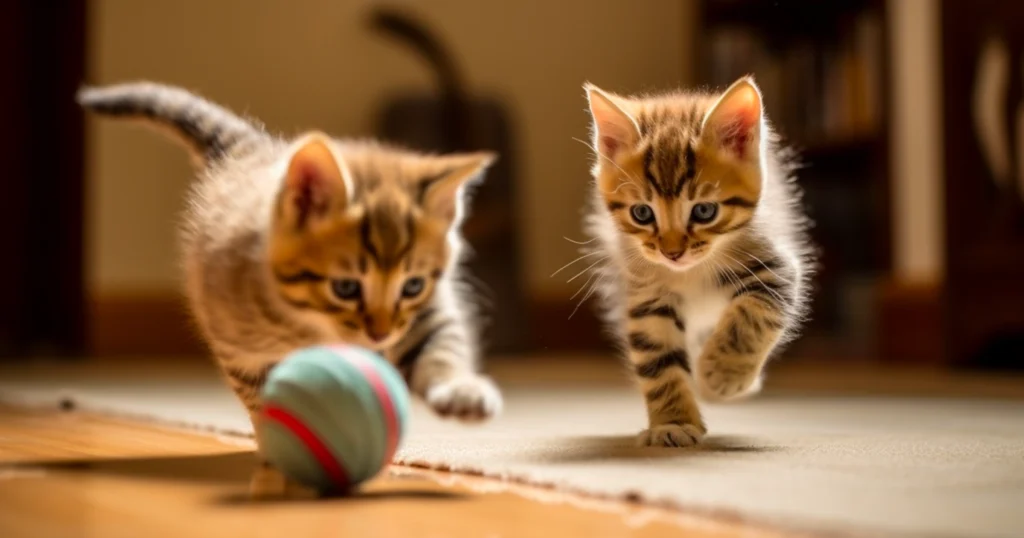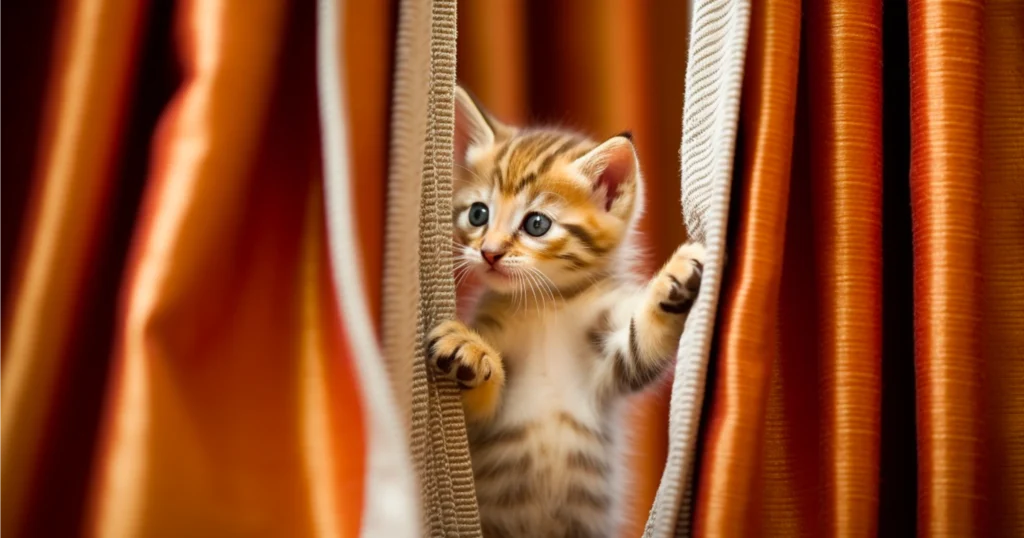Who can resist the charm of a fluffy, frisky kitten bounding around in a playful frenzy? One moment, they’re adorably snoozing on your lap, the next, they’re scaling your curtains, pouncing on invisible prey, or darting through the house like a tiny whirlwind. Indeed, the lively nature of kittens is part of their irresistible appeal. Yet, it often leaves new pet parents wondering, “Why is my kitten so hyper?”
Understanding your kitten’s hyperactivity starts with comprehending their natural behavior. Kittens are naturally curious and energetic creatures. Their world is a giant playground filled with things to explore, attack, and learn from. So when you see your kitten in a hyperactive mode, it’s usually an indication of their developmental stage.
In this blog post, we’ll delve into the factors that contribute to kitten hyperactivity, from their biological rhythms to their instinctual behavior. We’ll also provide some practical tips to manage their boundless energy effectively. So buckle up, and let’s unravel the mystery behind your hyperactive furball!
Understanding Kitten Energy Levels

Kitten Life Cycle and Energy Levels
To comprehend why your kitten might act like it’s just chugged an espresso shot, it’s helpful to understand their life cycle and how it affects their energy levels. Kittens, just like human babies, have periods of rapid growth and development. From birth until around six months, kittens are in their prime growth phase. During this period, their energy levels can rival that of a hyperactive squirrel on a sugar rush!
Their hyperactivity isn’t just a random event. It’s deeply intertwined with their biological makeup and growth needs. During the first few weeks of their lives, kittens primarily sleep and nurse. But as they approach the 4 to 6-week mark, a transformation takes place. Their eyes are wide open, and their paws are ready to pounce. This period is often referred to as the ‘socialization phase,’ where kittens explore their surroundings and learn essential life skills. It’s like they have an internal switch that’s flipped to ‘hyper mode.’
Biological Factors Affecting Hyperactivity in Kittens
Certain biological factors also contribute to your kitten’s hyperactivity. For starters, kittens have an extraordinary metabolism that burns through calories faster than you can say ‘catnip.’ This high metabolic rate fuels their energy levels, making them more active and playful.
Another biological aspect is their sleep cycle. Kittens sleep for an average of 16 to 20 hours a day. However, their sleep is usually interspersed with periods of intense activity. Their sleep-wake cycle is polyphasic, meaning they sleep and wake multiple times in a 24-hour period. This pattern often leads to ‘crazy kitten hours’ during dawn and dusk, leaving you questioning, “Why is my kitten so hyper?”
In essence, your kitten’s hyperactivity is a natural part of their development. It’s their way of exploring the world, growing, and learning to become self-sufficient cats.
Reasons: Why is My Kitten So Hyper?

Now that we’ve shed some light on kittens’ natural energy levels and their life cycle, let’s dive into the specific reasons behind the million-dollar question, “Why is my kitten so hyper?”
Excessive Playfulness: Exploring and Learning
First on the list is excessive playfulness. This isn’t mere mischief but an essential part of a kitten’s learning and exploration process. Each leap, pounce, and sprint is a means for kittens to hone their coordination, agility, and hunting skills. These playful antics help them understand their environment and learn how to interact with it. The world is their classroom, and playtime is their most exciting subject!
Hunting Instincts
Next up is the hunting instinct. Cats are natural predators, and this instinct kicks in pretty early in kittens. Their hyperactive behaviors, like chasing after balls or pouncing on toys, are miniature versions of the hunting behaviors you’d see in their wild counterparts. So when your kitten launches itself at a moving string, it’s actually practicing its predatory skills!
Lack of Exercise or Stimulation
Lack of exercise or stimulation can also contribute to your kitten’s hyperactivity. Kittens need plenty of mental and physical stimulation to burn off their excess energy. Without appropriate outlets, they can become overly active, using that pent-up energy in ways that may leave you exasperated.
Medical Reasons: Worms, Hyperthyroidism, etc.
Lastly, we can’t rule out medical reasons. Although less common, certain medical conditions, such as worms or hyperthyroidism, can cause increased activity in kittens. If your kitten’s hyperactivity seems excessive or is paired with other symptoms, like weight loss, increased thirst, or changes in appetite, it’s worth a trip to the vet.
In summary, kitten hyperactivity can stem from a blend of exploration, learning, hunting instincts, lack of stimulation, or even medical issues. The next time you find yourself wondering, “Why is my kitten so hyper?” remember these factors.
Tips to Manage Hyper Kitten

Alright, so we’ve got to the bottom of why your kitten might be doing its best Flash impersonation, zipping around like a furry little lightning bolt. Now let’s tackle the next challenge – managing your hyperactive kitten. Fear not, dear pet parent, for it’s much simpler than you might think.
Providing Adequate Play and Exercise
Topping our list is providing ample playtime and exercise. Interactive play sessions are crucial for burning off that excess energy. Play with your kitten several times a day using toys that stimulate their hunting instincts, like laser pointers or feather wands. These playtimes not only tire out your little furball but also strengthen your bond with them.
The Role of Diet in Managing Energy Levels
The diet also plays a significant role in managing your kitten’s energy levels. Ensure your kitten gets a balanced diet with all the necessary nutrients for healthy growth. High-quality kitten food provides the right balance of proteins, fats, and carbs to fuel their high energy levels and support their growth.
Training and Socialization
Proper training and socialization are also key. Socializing your kitten with other cats and people helps them learn acceptable behavior. Training them from a young age, using positive reinforcement techniques, can teach them boundaries and appropriate play. And remember, never use your hands or feet as playthings. This only encourages aggressive behavior.
Medical Check-up and Treatment
Last, but definitely not least, is regular medical check-ups and treatment. Regular vet visits ensure that your kitten is healthy and their hyperactivity isn’t due to any underlying medical issues. Your vet can also provide deworming treatments and check for any signs of conditions like hyperthyroidism.
In short, managing your kitten’s hyperactivity involves a balance of proper exercise, a balanced diet, socialization, and regular vet visits. If you still find yourself thinking, “Why is my kitten so hyper?” despite following these tips, it might be worth consulting with your vet or a cat behaviorist.
Conclusion
We’ve unpacked the energetic enigma of kittens and answered the common question, “Why is my kitten so hyper?” Remember, their hyperactivity is often a blend of their natural development, playful learning, hunting instincts, and even lack of adequate stimulation. On rare occasions, medical conditions may also play a part.
To manage a hyper kitten, ensure they have enough playtime and exercise, provide a balanced diet, teach them appropriate behavior through training and socialization, and never skip regular vet check-ups. In managing your kitten’s high energy effectively, you’re setting the stage for them to grow into a healthy, well-behaved adult cat. Stay pawsitive!


